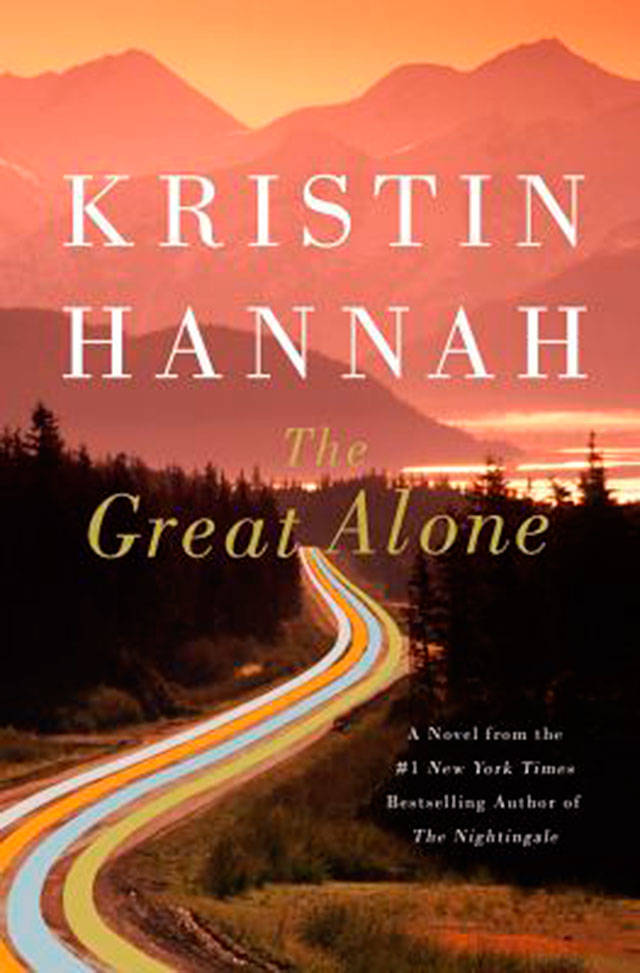By Margo / Everett Public Library staff
When Kristin Hannah’s new book “The Great Alone” became available there was a bit of a buzz around the office. When I received notice that my electronic hold was available, the timing couldn’t have been more perfect: We were scheduled to leave on vacation the following day.
Once the pilot gave the OK to power on electronic devices, I pulled out my new iPad with a relish of anticipation only to be quickly disappointed that I’d failed to download the book.
Lesson number one: You do not need to use Wi-Fi to read or listen to e-books or e-audio books, but you do need to download them to your device. I’d only gone as far as checking the book out; consequently, it was unavailable on my flight. However, I was pleased to access it on my return flight. Being on vacation is the best place to start a book. I sat on my sister’s patio on a balmy Tucson morning and entered into the uncharted pages of “The Great Alone.”
Alaska and Maine have long-held a fascination for me. They are destinations where I imagine adventures with unique grandeur and scenic marine swept beauty. Someday I hope to travel to these geographic east-west opposites. So far my experience has been literary. I have been to Maine in Christina Baker-Kline’s “A Piece of the World” and to the Alaskan Yukon through Eowyn Ivey’s “To the Bright Edge of the World.”
Hannah’s book engaged me from the get-go. Set in Seattle in 1974, the story quickly moves into the wild outskirts of the Kenai Peninsula in Alaska. Ernt Allbright is a Vietnam vet and former POW who receives his ticket out of Seattle via an unexpected inheritance of land from a deceased Army buddy. The family packs their meager belongings into a VW van and head up the ALCAN Highway.
Told through the eyes of Lenora (Leni), Hannah fleshes out a dysfunctional family bound by fear and devotion. I sympathized with Leni, who had to move from school to school, starting over far too many times. The peacekeeper of her family, she maintains a protective and loving relationship with her mom and a skewed but respectful relationship with her unpredictable father.
Situating the novel in a rugged and remote outpost of Alaska during the post-Vietnam era creates a tension that slowly builds in the pit of your stomach and continues to grow. Hoping to escape recurring nightmares and failed attempts to keep work after returning from Vietnam, Leni’s father promises things will be different this time around. Secrets, shame and disillusion begin to breed contempt, however.
For me, it is difficult to understand how a woman can allow a man to beat her one moment and then take him back the next, but that’s what Leni’s mother, Cora, does. She makes excuses, explaining that her father is sick; mother and daughter form an alliance and learn to speak the language of silence. Leni’s mom chose her man over a stable home and parents who loved her; Leni doesn’t have a choice.
The family arrives at the start of summer, when deceptive sunshine floods the late hours and food is in abundance. Had it not been for the intervention of wise and caring neighbors who extended kindness by helping the Allbrights prepare, the family would never have survived their first Alaskan winter. The hopeful enthusiasm for a fresh start begins to fade as the long, dark days of Alaskan winter creep in. The promise Leni’s dad made to stop drinking and beating his wife slowing dissipates, replaced by violence and vengeance fueled by whiskey and growing paranoia.
The stage is set for disaster and the plot thickens. Leni’s father’s jealousy is aimed at the father of her best friend, Matthew. Leni and her mother become adept survivalists, not only in the Alaskan Wilderness but in their own home.
At the time of this writing, there were 26 holds on the book, but the list was longer when I was reading the electronic version. At first I couldn’t put the book down, but I was forced to in order to meet the deadline for my book club. Then, about two-thirds of the way through “The Great Alone,” the story took a turn and went from a page turner to a “I can finish this later” type of book. I was not ready to completely give up, however, and was fortunate enough to snag a large print copy to continue reading.
I grew up in the Northwest and in the era depicted in Hannah’s story. I would have been about the same age as Leni, but my life looked much different. Even though I had my own family drama by the early 1980s, I was living my own dream: young, newly married and starting a family. We lived out in the country with a wood stove and thrived on simplicity. My idea of roughing it was romanticized by Laura Ingalls Wilder’s “Little House on the Prairie.” I knew little of the horrific aftermath of the Vietnam War and less of the devastation it took on men like Ernt.
“The Great Alone” is a story “behind closed doors,” giving insight into the pain and suffering that our country was still reeling from in the late 1970s early 1980s. Things were not perfect. Hannah captures and develops believable characters and portrays a young family trapped in crisis. I found the transition of pace and tension shifting gears a bit abrupt, but I loved the beautiful description of Alaska and how the story segues into a redemptive ending.
“The Great Alone” is a must read for 2018!
Be sure to visit the Everett Public Library blog for more reviews and news of all things happening at the library.
Talk to us
> Give us your news tips.
> Send us a letter to the editor.
> More Herald contact information.

























